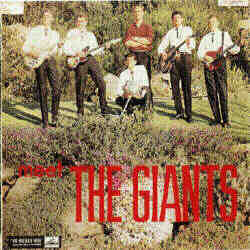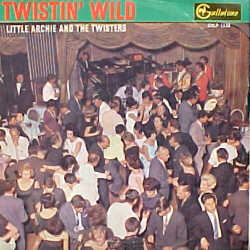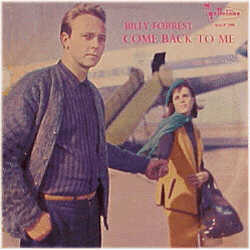
Bobby Angel was born Robert Engelsman on 30 December 1936 in Johannesburg. When Bobby was six months old, the family moved from Johannesburg to Kimberley. At the tender age of three, Bobby would be put on the counter of the local butcher to sing for the customers. As a teenager he became a successful amateur boxer winning no fewer than thirteen trophies in seven years! At this time he also mastered the drums and formed his own band with two friends. The band practised in Bobby's lounge and played gigs wherever they could often for no payment.
He progressed from drums to singing. often at weddings and dances for Hymie Baleson and Dan Hill at the Orange Grove Hotel. In the ensuing years Bobby sang with several bands in and around Johannesburg and worked with musician Manfred Lubbevatz, who later became known as Manfred Mann. During his military traning. while performing for fellow soldiers, he decided to develop his talent towards a possible singing career.
Bobby embarked on and completed a five.year apprenticeship to become a qualified diamond-cutter and polisher at his father's diamond-cutting factory He practised this occupation full-time while singing part-time at various cabaret spots, night-clubs and dance venues in and around Johannesburg. Bobby started primarily as a jazz and swing singer in the Sinatra mould, a genre that would remain close to his heart throughout his career. At that stage he was receiving critical acclaim for his vocal talents and, in 1960, landed a contract at the Rosebank coffee bar/restaurant, Chiquita's.
So popular was he at this venue, that pioneering producer Albie Venter recorded Bobby's first album live at the restaurant. The album, on the Gallotone label, was entitled Rockin' Swingin' Twistin' Bobby Angel. The record company considered his surname. Engelsman, too long and suggested 'Engel' Afrikaans for 'Angel' . After some deliberation, the English 'Angel' was decided upon by Dan Hill and so 'Bobby Angel' was born.
A newspaper critic hailed Bobby as "South Africa's most exciting singing discovery" in 1962. In 1966. after the demise of his grandmother and parents, he moved to a flat in Joubert Park. Here he literally met the 'girl next door', an English lass sojourning in Johannesburg en route to Canada as part of a round-the-world trip. In June 1966 Bobby and Chris French were married. In 1967 Bobby teamed up as vocalist with arranger Werner Krupski's group. Quartetto Krupski. Not only was Bobby adept at boxing, diamond.cutting and entertaining, he also proved to he an excellent. handyman.
In 1972, with producer Bryce Bradley, Bobby recorded two tracks that were released on a single for the (now defunct) Record and Tape Co. entitled, Build a New World and How Does It Feel. Although excellent recordings, the songs were not commercally successful. At this time, Bobby headed a group at Taylor's Travelodge in Johannesburg, where they enjoyed much success for the following two years.
Despite being an accomplished jazz singer, Bobby realised that, commercially speaking the South African record-buying public at large had musical tastes in a different category. He dropped his voice an octave, charged his vocal style and started singing Country and Western songs. In the summer of 1974, an agent from Teal Record Company approached Bobby to record a country song entitled, You Ask Me To. Produced by Hennie Bekker, the single was the turning point in his career and established Bobby Angel as a household name in South Africa. It entered Springbok's Top 20 hit parade in January 1975 and reached the #1 spot in March for two weeks, spending a total of 17 weeks on the charts. Bobby was presented with a Gold Disc for his achievement when sales of the single exceeded 25 000 copies.
Philip Solomon, manager of child-star Lena Zavaroni, impressed by Bobby's talent, was keen to take him to Britain where he had lined up television and radio performances for him. British trade union Equity, however, opposed the arrangements which were subsequently cancelled. Bobby's second single, Before the Next Teardrop Falls, was released and reached #5 on the charts in July 1975, spending 11 weeks on the charts. His singles had enjoyed chart success in neighbouring Rhodesia (now Zimbabwe), where he was invited for several television appearances and night-club performances. 1975 witnessed two more chart entries for Bobby on Springbok's Top 20. When his third and fourth singles, Don Junior and The Greatest Christmas Gift (wth Barbara Ray), entered the charts in December.
January and February of 1976 saw Bobby entertaining troops on the border in South West Africa (now Namibia), while March witnessed his South African TV debut on the Mimi Coertse variety show along with teen starlet Gwynneth Ashley-Robin and opera singer Bruce Martin. In March Bobby's 5th single, It's a Burning Thing was released. The song enjoyed a nine-week stay on the charts, peaking at #15 in May. In June, Teal Records honoured him for the feat of having five consecutive singles enter the charts. Shortly afterwards his LR It's a Burning Thing entered the LP Top 20 charts. The song Green Eyed Angel, written especially for Bobby by James Coleman of Nashville, Tennessee, was Bobby's sixth consecutive hit. Released in June, the single entered the charts in July reaching #5 on Springbok's Top 20 in September and spending 15 weeks on the charts in total.
In August, Bobby embarked on a six-week tour of the country with "International TV Startime" - a show which incuded Marie Gibson, Richard Loring, Mel Miller, Hansie Roodt, Cindy and Buzzy Ray. Billed on the show were visiting international group, The Wombles. When their producer Barney Smith skipped the country, they were asked to return to England by South African producer, Rod Alexander, after it was discovered that they (The Wombles) simply mimed to pre-recorded music.
In October 1976, Bobby and Barbara Ray, collected a SARIE Award for the category: Best Vocal Group. Bobby's fan mail had reached enormous proportions and his diary for live concerts was booked to capacity. He was approached to write a theme song, together with Hennie Bekker, for a new TV series entitled Call Me Kelly. His subsequent recording of Kelly's Song was so popular that Teal decided to release the track on a single. It reached #13 on Springbok's Top 20 in December 1977 and spent 7 weeks on the charts. When his contract with Teal expired in December, he received attractive offers from rival record companies. Bobby decided, however, to renew his contract with Teal as he enjoyed working with John Smithers whom he felt had done much for his musical career.
1978 witnessed Bobby sporting a beard - a look he maintains to this day. At that stage he was a regular on television, appearing in shows such as Pop Shop, Good Vibrations and Country Celebration. In March he signed a four-week contract to appear with the Dutch group Pussycat on their tour of South Africa. His polished performances and professionalism were praised by both audiences and critics alike. In September he was awarded the South African music industry's most coveted award: the 1978 SARIE Award for the category: S.A.'s Best Male Vocalist. Hs group Sidewinder accompanied him on all his gigs and also backed him on several of his albums.
Starting December 1979, Bobby hosted a fortnightly television show, Gentle On My Mind - created by SABC TV to cater for the increasng demand by viewers for Country music. A distinguishing element of the show was that guest stars performed live and did not mime to pre-recorded tapes, as is the norm on music programmes. The series was so popular that its run was extended for a further year and an album by the same name released. A highlight of the show for Bobby was when American country star, Glen Campbell, appeared as a guest on his show. Not only was Glen a special guest artist, he also sang back vocals on one of Bobby's performances. Another international artist to appear on Bobby's show was Susan Anton. In September 1980 Lance James launched the Springbok Radio (country) festival which was attended by 10 000 enthusiastic country fans. The line-up of stars included Barbara Ray, Marie Gibson, Tommy Dell, Bobby Angel and his backing group, Sidewinder. The festival was repeated the following year at the Rand Show where a record attendance figure of 40 000 fans was recorded. A rare appearance by retired country veteran Charles Jacobie delighted the audience who gave him a standing ovation.
As with some of his (Teal) predecessors Virginia Lee and Barbara Ray, Bobby chose not to renew his recording contract with Teal, but accepted a generous offer from a rival company EMI in December 1980. His first album under ths banner, The Country Music of Bobby Angel, was released shortly afterwards. He guested on Highveld Country and performed at the 1981 Arts Awards. At this time Bobby resigned from his job as a diamond cutter and turned his energies to a full time musical career.
In 1982 EMI appointed Bobby as a producer of various artists' albums. Although he had co-produced some of his own albums, his LP Angel Eyes would be his first solo production. In 1983 Bobby and Barbara Ray were in the charts again with their recording of Voices, which entered the Top 20 of Springbok's (now) Top 30 hit parade. The song spent 12 weeks on the charts. In August Bobby was awarded two Gold Records for his albums The Angel and The Country Music of Bobby Angel. The year also saw another successful Springbok Radio Keep It Country show at Milner Park and the return of Bobby's ever popular TV show, Gentle On My Mind, which ran until 1985. His show was voted among the Top 10 most popular TV shows in the country. In 1985 Bobby undertook a nationwide tour along with South Africa's biggest country names in the CarlingCountry Tour. He continued touring and performing until 1988, when he announced his retirement from show business.
Recently Bobby made a welcome return to the recording booth when he recorded a new album. This collection recalls an earlier period, though, and includes rare gems from Bobby's early recording career such as Around The World and Beyond The Sea, which demonstrate his impressive vocal versatility. Many titles, too, make a welcome appearance for the first time in CD format. Gallo Record Company honours South Africa's 'King Of Country Bobby Angel.
Bobby Angel has earned the title “King Of Country”, mainly due to the popularity of his Television series “Gentle On My Mind”, in the eighties. His hits include “You Ask Me To”, “Green Eyed Angel”, “Living On Love” & “Terug By My Mense”.
In 2008 Bobby released his best CD ever, titled “Somebody Like You” and together with Billy Forrest, an album of Foster & Allen Hits, which has just been released with firm predictions that this could be the “big one” for 2009. Both Bobby and Billy were nominees in this year’s SAMA Music Awards, in the Country Music category, and Bobby ended up the winning, despite strong opposition from other top artists. such as Ray Dylan and Freddi Nest.
| |
 |
|
|
 The legends of South African country music share the stage at The Carousel Casino & Entertainment World’s Cheyenne Saloon on 24 and 25 January for the ultimate country show – Country Magic. Lance James, Tommy Dell, Barbara Ray, Sally Vaughn, Clive Bruce and The Rodeo Girls will dish up the best country show south of Texas for two spectacular evenings.
The legends of South African country music share the stage at The Carousel Casino & Entertainment World’s Cheyenne Saloon on 24 and 25 January for the ultimate country show – Country Magic. Lance James, Tommy Dell, Barbara Ray, Sally Vaughn, Clive Bruce and The Rodeo Girls will dish up the best country show south of Texas for two spectacular evenings.
 The Rodeo Girls are a new addition to Lance James’ live show, but have also achieved notable solo success, both locally and internationally, with their dynamic performances over more than 15 years. The only professional line dance group in South Africa, The Rodeo Girls have made a name for themselves with both singing and dancing. They’ve appeared on multiple South African TV shows and music DVDs and have shared stages with country legends and pop stars alike. They’ve also achieved international success, winning awards at the American Dance Awards in Orlando and in Austria.
The Rodeo Girls are a new addition to Lance James’ live show, but have also achieved notable solo success, both locally and internationally, with their dynamic performances over more than 15 years. The only professional line dance group in South Africa, The Rodeo Girls have made a name for themselves with both singing and dancing. They’ve appeared on multiple South African TV shows and music DVDs and have shared stages with country legends and pop stars alike. They’ve also achieved international success, winning awards at the American Dance Awards in Orlando and in Austria.
 Music-Videos
Music-Videos



























 Billy Forrest – the living legend!
Billy Forrest – the living legend! 
























